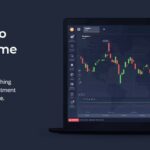Prop Trading vs Broker Trading | Overview
Traditional trading (broker trading) is when an individual or firm invests their own money in the stock market with the goal of making a profit. They will typically use a variety of strategies, such as value investing, momentum trading, or day trading. While prop trading (proprietary trading) is a type of trading that involves trading with the firm’s own capital, rather than with clients’ funds. We’ll walk you through the differences between prop trading vs broker trading in this review.
Prop traders are typically employed by large financial institutions, such as banks, hedge funds, and investment firms. They are responsible for deciding which securities to buy and sell, and when to do so. The firm typically gives prop traders a certain amount of capital to trade with and expects them to generate profits. Rewarding them with a portion of the profits they generate.
Prop trading is a high-risk, high-reward type of trading. Traders must be able to make quick decisions and have a good understanding of the markets to be successful. They must also be able to manage risk effectively, as losses can be significant. Prop trading is a popular career choice for those who are looking for a fast-paced and potentially lucrative career in the financial markets. However, prop trading is not suitable for everyone. Understand the risks involved before engaging in this type of trading.
Advantages of a Prop Trading Funded Account
To get a funded account, traders must first become approved traders at a prop trading firm. This typically involves providing proof of experience, passing certain proficiency tests, and having a solid trading strategy. Once approved, traders must then meet the minimum capital requirements set by the broker, and then they will be provided with a funded account.
- Traders can then use the funds provided by the firm to start trading in the open market. This allows traders to open larger positions and potentially make larger profits.
- Prop trading funded accounts typically offer leverage, allowing traders to control larger positions than they would otherwise be able to.
- Traders are given access to sophisticated trading algorithms and technology, allowing them to make more informed and timely decisions.
- Offer traders the advantage of diversifying their portfolios, as they can invest in various asset classes and markets.
Broker Trading Benefits
- Access to a wider range of financial products and markets: Brokers provide access to a wide variety of financial markets, including stocks, bonds, options, commodities, Forex, and more. This allows traders to diversify their portfolios and take advantage of investment opportunities they may not have access to otherwise.
- Lower trading costs: Brokers typically charge lower trading fees and commissions than trading directly through an exchange. This can add up to significant savings over time.
- Expert advice: Brokers provide experienced and knowledgeable advice on a range of investment and trading topics, including market analysis, portfolio management, and risk management.
- Convenience: Brokers provide a convenient way to access a variety of markets, often with just one platform. This makes trading easier and more efficient.
- Safety: Brokers typically offer more secure trading environments than direct exchanges. This helps protect traders’ funds from potential malicious activity.
Differences between a Broker Trading and a Prop Trading Account
A Broker Trading Account is an account with a broker or brokerage firm that allows an investor to make trades in the financial markets. The broker will typically provide the investor with access to various financial instruments, such as stocks, bonds, derivatives, and currencies. As well as access to research and analysis tools to help the investor make informed decisions. The broker will also execute the investor’s trades on their behalf.
A Prop Trading Account is an account with a proprietary trading firm. These firms typically employ traders to trade their own capital in the markets, rather than client funds. These firms are not typically regulated, and the trades they make are highly speculative. The goal of the proprietary trader is to make profits for the firm itself. As such, they typically focus on short-term strategies and take greater risks than a typical retail investor.
The Volcker Rule
The Dodd-Frank Wall Street Reform and Consumer Protection Act includes the Volcker Rule, which was proposed by former Federal Reserve Chairman Paul Volcker. The purpose of the rule is to prevent banks from engaging in speculative investments that do not directly benefit their customers. The global financial crisis and the realization that large banks had been taking excessive risks inspired this law.
Volker argued that commercial banks engaging in high-risk investments had an adverse effect on the stability of the financial system as a whole. These banks implemented proprietary trading to take advantage of derivatives in order to reduce potential losses, yet this could increase risk in other areas.
The Volcker Rule prevents banks and institutions that are associated with a bank from partaking in proprietary trading. As well as investing or owning a hedge fund or private equity fund. As far as market-making goes, banks prioritize client satisfaction, and their compensation is generated through commissions. On the other hand, when it comes to proprietary trading, the customer has no bearing and the bank retains all the profits.
In response to the Volcker rule, major banks have taken measures to separate their proprietary trading function from their core activities. Such as shutting it down completely, in order to remain objective in their activities that benefit the customer and limit conflicts of interest. Specialized prop trading firms now offer proprietary trading as a standalone service.
The financial industry generally has a negative opinion of the Volcker Rule, much like the Dodd-Frank Act. They perceive it as an unnecessary and ineffective form of governmental regulation. The Volcker Rule eliminated banks’ proprietary trading, which has been argued to have provided liquidity for investors.
How to be a Successful Prop Trader?
Being a successful prop trader requires a combination of hard work, dedication, and knowledge. To become a successful prop trader, you must first understand the basics of trading and the markets. You must also have a good understanding of risk management and the ability to make sound decisions.
The first step to becoming a successful prop trader is to develop a trading plan. This plan should include your goals, strategies, and risk management techniques. It should also include a timeline for when you plan to enter and exit trades.
Once you have developed a trading plan, you must then learn the basics of trading. This includes understanding the different types of markets, the different types of orders, and the different types of analysis. You should also familiarize yourself with the different types of trading platforms and the different types of brokers.
Once you have a good understanding of the basics of trading, you must then practice trading in a simulated environment. This will allow you to gain experience and develop your trading skills without risking real money.
Finally, you must stay up to date with the markets and the news. This will help you to make informed decisions and stay ahead of the competition.
By following these steps, you can become a successful prop trader. However, it is important to remember that trading is a risky business and you should never invest more than you can afford to lose.
Automated Prop Trading
Automated prop trading, or algorithmic trading, is a form of trading that uses computer algorithms to execute trades. This type of trading has become increasingly popular in recent years due to its ability to provide traders with a number of advantages. Here are some of the benefits of automated prop trading:
- Speed: Automated prop trading is much faster than manual trading. Algorithms can execute trades in milliseconds, allowing traders to take advantage of market opportunities quickly. This can be especially beneficial for traders who are looking to capitalize on short-term market movements.
- Accuracy: Automated prop trading is much more accurate than manual trading. Algorithms are programmed to follow specific rules and execute trades based on those rules. This eliminates the possibility of human error, which can be costly in manual trading.
- Cost: Automated prop trading is much less expensive than manual trading. Algorithms can be programmed to execute trades at a fraction of the cost of manual trading. This can be especially beneficial for traders who are looking to trade on a budget.
- Flexibility: Automated prop trading is much more flexible than manual trading. Algorithms can be programmed to execute trades based on a variety of criteria, allowing traders to customize their trading strategies to fit their individual needs.
- Risk Management: Automated prop trading can help traders manage risk more effectively. Algorithms can be programmed to limit the amount of risk taken on each trade, allowing traders to protect their capital while still taking advantage of market opportunities.
Overall, automated prop trading can provide traders with a number of advantages. By utilizing algorithms to execute trades, traders can take advantage of market opportunities quickly and accurately, while also managing risk more effectively.
Prop Trading vs Broker Trading | Conclusion
In conclusion, prop trading vs broker trading are both effective ways of trading stocks. However, they have different advantages and disadvantages. Broker trading is often preferred for those who are just starting out as it is less risky than prop trading. Prop trading on the other hand is more suited for experienced traders who are willing to take on more risk in order to potentially gain larger returns. Ultimately the decision of which type of trading to use comes down to the individual’s preferences and trading goals.














